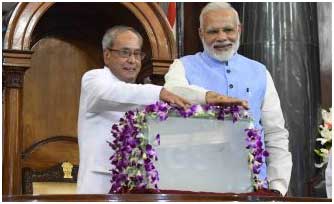 New Delhi, July 1 President Pranab Mukherjee on Friday said that introduction of GST was a “momentous event” for the nation and “a tribute to the maturity and wisdom of India’s democracy” while pointing out that the success of major changes always depends on their effective implementation.
New Delhi, July 1 President Pranab Mukherjee on Friday said that introduction of GST was a “momentous event” for the nation and “a tribute to the maturity and wisdom of India’s democracy” while pointing out that the success of major changes always depends on their effective implementation.
Mukherjee also said in coming months, based on the experience of actual implementation, the GST Council and the central and state governments should continuously review the design and make improvements, in the same constructive spirit.
“Introduction of Goods and Services Tax (GST) is a momentous event for the nation. This historic moment is the culmination of a 14-year-long journey which began in December 2002, when the Kelkar Task Force on indirect taxation suggested a comprehensive Goods and Services Tax (GST) based on the Value Added Tax principle,” said Mukherjee while delivering his speech in the Central Hall of Parliament at the GST launch ceremony.
“I was closely involved in the design and implementation of GST as the then Finance Minister. I also had the privilege of giving assent to the Constitution (One Hundred and First Amendment) Act, 2016 (the GST Act),” he added.
Mukherjee said: “It is also a moment of some satisfaction for me personally because, as the Finance Minister, I had introduced the Constitution Amendment Bill on March 22, 2011.”
“I was closely involved in the design and implementation and had the occasion to meet the Empowered Committee of state Finance Ministers, formally and informally, as many as 16 times. I also met the Chief Ministers of Gujarat, Bihar, Andhra Pradesh and Maharashtra a number of times,” he added.
Mukherjee also said the new era in indirect taxation was the result of a broad consensus arrived at between the Centre and the states.
“It (GST) is a tribute to the maturity and wisdom of India’s democracy. The GST will make exports more competitive and also provide a level playing field to domestic industry to compete with imports,” said Mukherjee.
“Under the GST, the tax incidence will be transparent, enabling full removal of tax burden on exports. The GST will be administered through a modern world-class information technology (IT) system,” he added.
“A key feature of the system is that buyers will get credit for tax paid on inputs only when the seller has actually paid taxes to the government. It (GST) will create a strong incentive for buyers to deal with honest and compliant sellers who pay their dues promptly. Success of major changes always depends on their effective implementation,” he pointed out.
Mukherjee also said: “GST is a disruptive change. It is similar to the introduction of VAT when there was initial resistance. When a change of this magnitude is undertaken, there are bound to be some teething troubles and difficulties in the initial stages.
“We will have to solve these with understanding and speed to ensure that it does not impact the growth momentum of the economy,” he added.